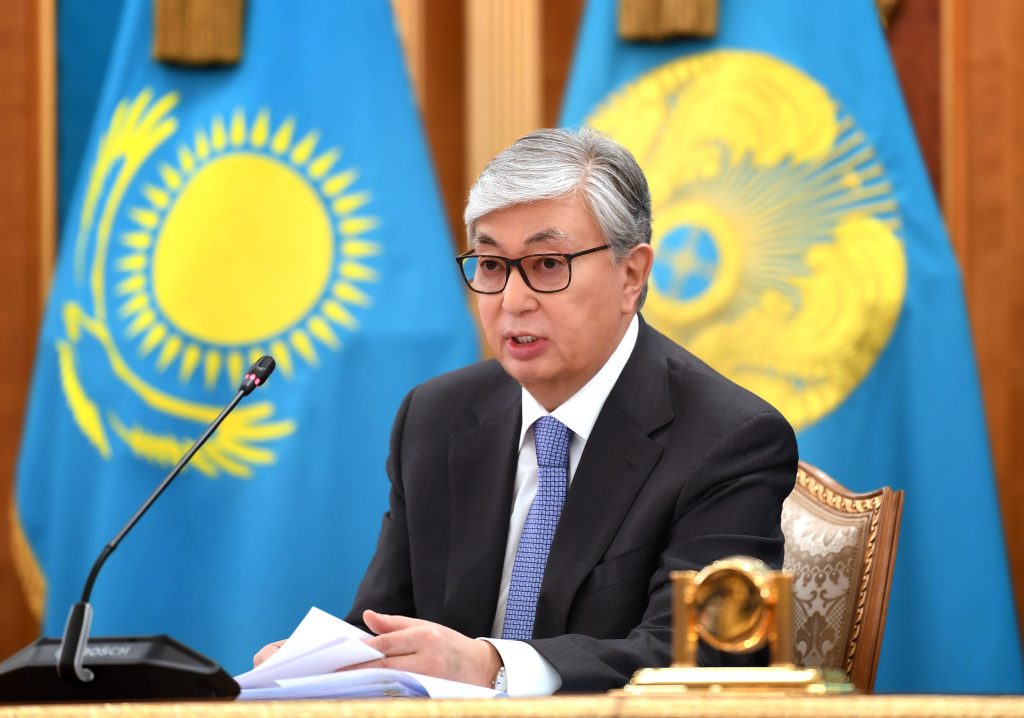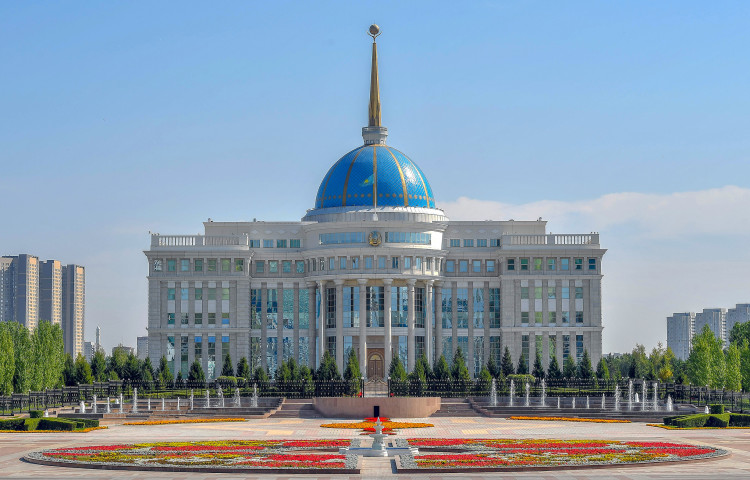President of Kazakhstan Kassym-Jomart Tokayev (below) has signed a decree “On further measures of the Republic of Kazakhstan in the field of human rights”, which instructs the government to approve the action plan setting out “Priority Measures in the Field of Human Rights”.
Along with its nation-building after gaining independence following the collapse of the Soviet Union, Kazakhstan has followed a path of controlled democratisation, which became more streamlined since Mr Tokayev took over as president in June 2019.
 He highlighted specific plans for government actions aimed at addressing human rights issues through legislation during a second meeting of the National Council of Public Trust in December 2019 and also spoke about human rights issues during his annual State-of-the-Nation Address in September 2020.
He highlighted specific plans for government actions aimed at addressing human rights issues through legislation during a second meeting of the National Council of Public Trust in December 2019 and also spoke about human rights issues during his annual State-of-the-Nation Address in September 2020.
In particular, he instructed the government to take comprehensive measures to protect citizens, especially children, from cyberbullying, combat human trafficking and torture.
In February 2021, the President proposed a new package of measures aimed at enhancing human rights protection for convicted persons, as well as strengthening legal mechanisms for the protection of the rights of women.
The new decree is in line with the concept of a “listening state”, put forward by Mr Tokayev. It envisages a government that listens to the comments and criticisms of the society.
As part of this concept, the government is implementing substantial political reforms that cover three broad areas – democratisation of the country’s political system, more power to the people and strengthened human rights.
The new decree covers the areas of:
* Improving the mechanisms of interaction with the UN treaty bodies and special procedures of the UN Human Rights Council;
* Ensuring the rights of victims of human trafficking;
* Human rights of citizens with disabilities;
* The elimination of discrimination against women;
* The right to freedom of association;
* The right to freedom of expression;
* The human right to life and public order:
* Increasing the efficiency of interaction with non-governmental organisation;
* Human rights in criminal justice and enforcement and prevention of torture and ill-treatment.
“An important stage of political modernisation is a further implementation of concrete measures in the field of human rights. A corresponding decree was signed today (June 9). The government has been instructed to adopt an Urgent Action Plan for its implementation,” Mr Tokayev said on Twitter.
According to the Decree, the Office of the President of Kazakhstan will be responsible for overseeing the implementation of the Action Plan. The government will submit to the presidential administration a report on the work carried out to implement the Plan on an annual basis.
The issue of the protection of human rights has been a priority for President Tokayev since his election as Head of State in June 2019. He highlighted specific plans for government actions aimed at addressing human rights issues through legislation during a second meeting of the National Council of Public Trust (December 2019).
The President also spoke about human rights issues during his annual State-of-the-Nation Address in September 2020. In particular, he instructed the government to take comprehensive measures to protect citizens, especially children, from cyberbullying, combat human trafficking and torture.

In February 2021, at the fifth meeting of the National Council of Public Trust, the President proposed a new package of measures aimed at enhancing human rights protection for convicted persons, as well as strengthening legal mechanisms for the protection of the rights of women.
The adoption of the 9th June Decree further formalises human rights as one of the basic priorities of state policy. The implementation of its provisions will further promote the protection of human rights in Kazakhstan and contribute towards building a just and progressive state.
To commemorate the 30th anniversary of its independence, Kazakhstan has put up its candidacy for a place in the United Nations Human Rights Council for 2022-2024. The elections are scheduled for October 2021 in New York.
Upholding human rights has been a priority for Kazakhstan since it became independent. The country joined the Universal Declaration of Human Rights, the International Covenant on Civil and Political Rights, the International Covenant on Economic, Social and Cultural Rights and other relevant UN human rights conventions.
Comprehensive national legislation was adopted in keeping with the highest international standards and it has been realised by working very closely with the entire UN system.
Attaching high importance to the work of the Human Rights Council, Kazakhstan has always been guided by the vision of advancing universal respect for all people, based on the principles of impartiality and objectivity. The country has demonstrated its steadfastness to these fundamental values throughout its term on the UN Human Rights Council from 2013-2015.
Although it has not been a member thereafter, Kazakhstan continues to contribute actively to the Council’s work by promoting and furthering the highest norms of equality and non-discrimination in every dialogue and cooperation with all regional groups and international fora.
Currently, Kazakhstan is in the process of joining the Optional Protocol to the Convention on the Rights of the Child and ratifying the Optional Protocol to the Convention on the Rights of Persons with Disabilities.
In order to expand the means of protecting the rights of its citizens at the international level, Kazakhstan has recognised the competence of four UN committees to accept individual petitions from citizens concerning violations of their rights: The Committee against Torture, the Committee on the Elimination of Discrimination against Women, the Committee on the Elimination of Racial Discrimination and the Human Rights Committee.
Kazakhstan has also decided to recognise the mandate of the Committees onthe Rights of the Child and on the Rights of Persons with Disabilities. It is in the process of acceding to the Optional Protocol to the Convention on the Rights of the Child and ratifying the Optional Protocol to the Convention on the Rights of Persons with Disabilities.
Presidential aide Erlan Karin reflected on the previous human rights reforms initiated by Mr Tokayev, including the abolition of the death penalty in late 2019.
He pointed out that there has been a consistent focus on the importance of regulations against cyberbullying, human trafficking, torture, staff misconduct in penitentiary institutions and gender discrimination in Mr Tokayev’s state-of-the-nation addresses and meetings with the National Council of Public Trust.
“The implementation of all the provisions enshrined in this decree will foster a comprehensive modernisation of the human rights sphere and will become our next step towards building a just and progressive state,” Mr Karin told the Astana Times.
Ms Zhemis Turmagambetova, president of the Charter for Human Rights Public Fund, told the paper that the decree presents an opportunity to transform the human rights issue from an abstract problem into a practical matter with efficient solutions.
According to her, the current Kazakh legislative system needs modernisation and reforms to make it more well-structured.
“It is the government’s turn to develop plans for the implementation of the decree. It must clearly follow the principles of a responsive government,” Ms Turmagambetova said, adding that the state should involve civil society and international experts in a “constructive partnership.”
At the same time, boosting Kazakhstan’s human rights record could bring economic benefits, noted Mr Usen Suleimen, ambassador at large for human rights at the Kazakh foreign ministry, with potential foreign investors attracted by a more stable, lower-risk economic environment.
“The step taken by the president is an important strategic decision aimed at strengthening the economic side of Kazakhstan’s development. We can expect the bolstering of economic relations with the countries of Europe, America and Asia leading up to the formation of a powerful regional economy,” Mr Suleimen told the Astana Times.
“However, it largely depends on the implementation of the action plan and on the dialogue with civil society,” he added.
The decree came into effect after its signing and its implementation will be monitored and enforced by the administration of the president.
The results of the action plan are expected to be discussed annually, with the first assessment due on 25 January 2022.












